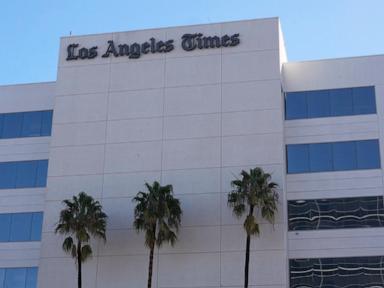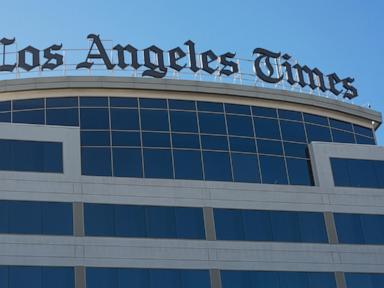Newspaper endorsements have outlived their purpose

Upon hearing that both the Los Angeles Times and Washington Post would refrain from endorsing a presidential candidate this year, one thought popped up in my mind: What took them so long?
This may sound odd coming from someone who made a career out of writing editorials and opinion columns for newspapers, but I’ve never supported endorsing political candidates. In fact, I strongly advised against the practice at each place where I’ve overseen the editorial pages.
I have no problem with publications letting their readers know where they stand on specific topics. Opinion writing allows journalists to provide news in a unique way; we all relate to someone else expressing their views because we all have our own.
Editorials, therefore, carry a certain weight with readers. These unsigned opinion pieces convey the collective viewpoint on a topic by members of the editorial board. It’s not just one person’s perspective, as it is with an opinion column; this is a position reached by a group of individuals after debate, compromise and consensus.
But political endorsements muddy the waters of a newspaper’s independence. A candidate favored by editorial board members becomes “their” candidate moving forward.
I saw this occur at the daily newspaper company in Northern New York where I worked as the editorial page editor. We endorsed the challenger to an incumbent district attorney one year, and she became a train wreck from day one. When we criticized her bizarre actions in editorials over the next four years, someone always reminded us that we had endorsed her in the first place.
And what happens if a favored candidate loses a primary? We endorsed a congressional candidate one year over the eventual primary winner, then had to revamp our arguments for the general election in favor of the candidate we previously argued against. Readers can be forgiven for questioning our editorial judgment.
Endorsing political candidates differs sharply from weighing in on campaign issues. Like we saw with our district attorney candidate, people have traits that don’t always materialize before an election; backing certain candidates can backfire horribly if they engage in behavior that you didn’t anticipate. Referendum measures, conversely, don’t have skeletons in their closets.
Endorsing candidates also makes readers suspicious of news coverage provided for these campaigns. And regardless of whether these suspicions have any merit, they create an image that sticks for a long time.
Most of the reactions I read about the decision by the Los Angeles Times and Washington Post to not endorse any presidential candidate noted that such editorials no longer have much influence on voters. People disturbed by these newspapers’ choices said their concerns centered more on how this process was carried out, and I agree with them on this.
Both publications had long traditions dating back decades of supporting specific presidential candidates. To announce they are reversing course within two weeks of the election smacks of last-minute pressure exerted by the two billionaire owners rather than some careful reflection by the editorial boards. This should have been done at least a few months ago to avoid the perception that protecting outside business interests played any role.
But admitting that presidential endorsements don’t really move the needle of public opinion makes my case stronger. If those in the news industry know these editorials don’t actually help people make informed choices, what purpose do they serve?
Endorsements now often get attention for the wrong reason. The newspapers themselves become the subject of scrutiny, not the points they’re making.
This frequently occurs when newspapers make endorsements in contentious races. Readers usually don’t discuss the arguments presented for or against certain candidates — they focus on what “hidden agenda” the newspaper may have had in making such an endorsement. This does nothing to help the publication guide its readers on a thoughtful exploration of who’s best for elective office.
Candidate endorsements have outlived their useful purpose. Newspapers would be wise to abandon the practice and concentrate on providing voters with the relevant information they need to make good decisions. This would strengthen the credibility of media outlets and allow readers to feel more secure about the reliability of the news they’re receiving.
Jerry Moore is a freelance journalist residing in Northern New York. He previously served as a newspaper editor and opinion writer.
-

These are the major newspapers that have and haven't endorsed Trump and Harris
Politics - The Hill - October 27 -

Puerto Rico's biggest newspaper endorses Harris
Politics - The Hill - October 29 -

‘Anticipatory obedience’: newspapers’ refusal to endorse shines light on billionaire owners’ motives
World - The Guardian - October 26 -

How the standard of political endorsements from newspapers has evolved
Politics - NBC News - October 30 -

Trump: Newspapers pulling endorsements means 'I'm doing a great job'
Politics - The Hill - October 30 -

Washington Post becomes second major US newspaper this week to not endorse a presidential candidate
Entertainment - ABC News - October 26 -

Newspaper non-endorsements at Washington Post, LA Times fit a trend, but their readers aren't happy
Entertainment - ABC News - October 29
More from The Hill
-

Top Florida health official advises against fluoride in drinking water
Politics - The Hill - 6 hours ago -

Trump taps NFL player Scott Turner as head of HUD
Politics - The Hill - 8 hours ago -

Trump names Seb Gorka, Alex Wong to be senior national security staff
Politics - The Hill - 8 hours ago -

John Hopkins surgeon and COVID contrarian Marty Makary selected to lead Trump’s FDA
Politics - The Hill - 8 hours ago -

Trump Cabinet picks: Here’s who’s on the list to carry out his agenda
Politics - The Hill - 8 hours ago